
Research Results
ICT Application and Integration by Teachers Beginning to Implement the IMYM Model
Prepared by Distance Learning and Information Technologies Unit, Program Development Branch, Manitoba Education and Early Childhood Learning
Analysis of Teachers' Self-reported Pedagogical Skills in Integrating ICT
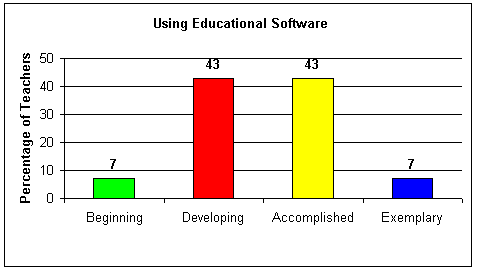
Most teachers (86%) place themselves at either the Developing or Accomplished level for educational software use (see Appendix B Part I). These teachers use educational software as an instructional supplement or to provide experiences otherwise unavailable to students. Of all the 10 pedagogical skills surveyed, the highest percentage of teachers place themselves at the Accomplished level (43%) and at the Exemplary level (7%) for the use of educational software.
Using ICT to Improve Student Writing
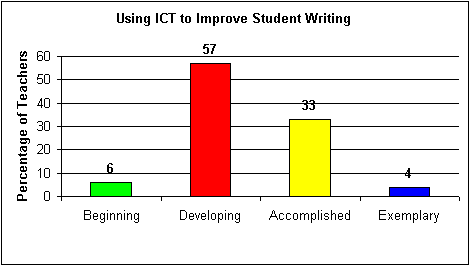
More than half the teachers (57%) place their pedagogical skill at the Developing level of using ICT to improve student writing (see Appendix B Part II). At this level, even though students are not expected or encouraged to compose or edit using the computer, teachers ask that the final draft of some student writing assignments be word processed. One third of teachers place their skills at the Accomplished level. At the Accomplished level, teachers help students use the computer in all phases of the writing process. They also use technology to help students share their work with a wide variety of reading audiences. Only 6% of teachers said they are not familiar with any technologies that would allow them to help students improve their writing skills (Beginning level).
Teaching Information Literacy Skills using Resource-based Learning
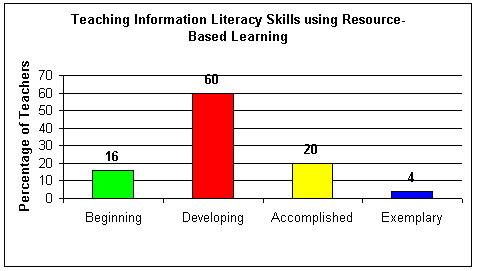
Sixty percent of teachers respond that they are at the Developing level of teaching information literacy skills using resource-based learning (see Appendix B Part III). These teachers have students use electronic resources in their resource-based learning projects. Twenty percent of teachers collaborate with the teacher-librarian or other classroom teachers and design resource-based learning projects that require higher-level thinking skills, electronic information sources, and the use of computer productivity software (Accomplished level). However, 16% of teachers are not familiar with the term information literacy and do not yet know why such skills are important (Beginning level).
Teaching Information Literacy Skills using Primary Sources
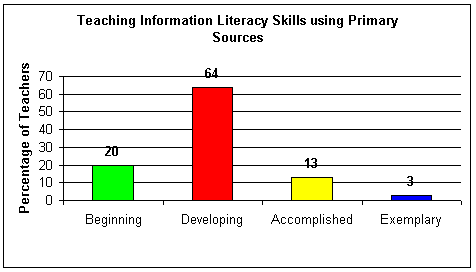
Sixty-four percent of teachers place themselves at the Developing level for teaching information literacy skills using primary sources (see Appendix B Part IV). As part of their instructional strategies, these teachers include student projects that require collection and analysis of original data. They can generally predict the outcome of their students' experiments or surveys. Twenty percent of teachers expect their students to do research using only secondary resources such as books, magazines, or reference materials (Beginning level). Only 13% of teachers said they teach their students how to use spreadsheets and databases to record, organize, analyze, and communicate their collection of original data (Accomplished level).
Modifying Instructional Approach
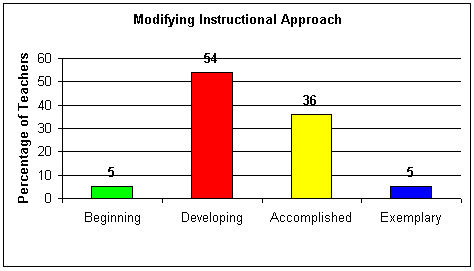
More than half (54%) the teachers place themselves at the Developing level of pedagogical skill at using technology to modify their instructional approach (see Appendix B Part V). These teachers have initiated units or projects that have a technology component, but most use of technology by their students takes place in a computer lab rather than directly in the classroom. More than a third (36%) of the teachers report using a variety of instructional delivery methods and student grouping strategies routinely throughout the year. They also use small groups working collaboratively in learning centres on classroom computers (Acccomplished level).
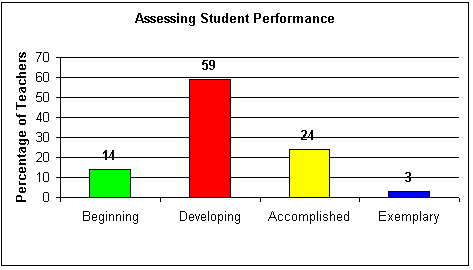
Fifty-nine percent of teachers place themselves at the Developing level for assessing student performance (see Appendix B Part IV). These teachers evaluate some student performances or products using subjective as well as objective criteria. They also print copies of electronic work such as word processed documents, graphics and presentations to include in portfolios for student/parent/teacher conferences. At the Accomplished level, 24% of teachers evaluate student projects and performances by using technology-created assessment tools such as checklist, rubrics, and benchmarks that help students assess their own and their peers' performances. As well, these teachers can objectively determine the quality of student work and have a computerized means of aggregating performance data.
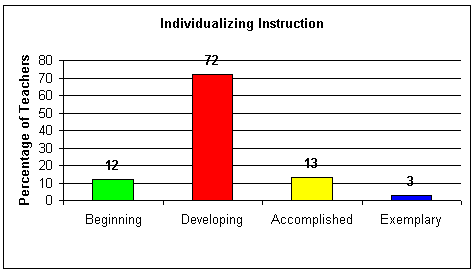
Almost three-quarters of teachers (72%) identify themselves at the Developing level for individualizing instruction (see Appendix B Part VII). This is the highest rating at the Developing level for any of the pedagogical skills rated. At this level, teachers agree that they occasionally give students a choice of assignments, but that all students in their class (unless in a modified program) must achieve the same learning outcomes within the same time frame. Skill remediation with students using technology is done during or after school. Only 3% of teachers placed themselves at the Exemplary level for individualizing instruction. This suggests that very few teachers have access to computerized planning and reporting tools for individualizing instruction.
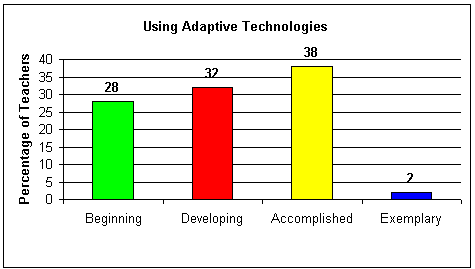
Twenty-eight percent of teachers indicate that they are not aware of how technology can help students with physical or mental challenges (Beginning level) (see Appendix B Part VIII). One third of teachers identify themselves at the Developing level for using adaptive technologies and are able to work with students who may bring special devices to work and communicate in the classroom. Many teachers (38%) can also use technology when appropriate to help students with special learning needs (Accomplished level).
Using Technology for Professional Learning and Communication
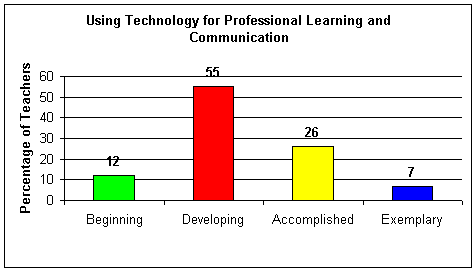
Over half the teachers (55%) place their skills at using technology for professional learning and communication at the Developing level (see Appendix B Part IX). These teachers can find lesson plans and educational research online. They also correspond with parents and other teachers using email. One quarter of teachers use the Internet and its online resources to obtain research, teaching materials, and information related to the content of their classes (Accomplished level). However, only 7% of teachers organize professional learning opportunities for other teachers and feel comfortable teaching colleagues how to use technology to enhance instruction. This points to the need to offer increased opportunities for teacher opinion leaders to mentor their colleagues. It also points to the need to offer increased access to online methodologies to maintain the IMYM learning community.
Researching and Evaluating the Use of ICT in Education
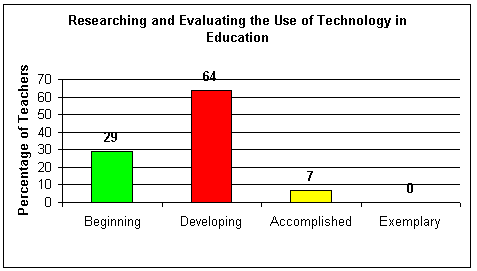
Twenty-nine percent of teachers report their skills at the Beginning level for researching and evaluating the use of ICT in education (see Appendix B Part X). This is the highest rating at the Beginning level for any of the pedagogical skills rated. These teachers indicate that they have not attempted to determine when the use of ICT has made a difference in their students' learning or in classroom climate nor how to find out if ICT is effective in their classroom. Sixty-four percent of teachers indicated they are collecting, using and sharing with colleagues, anecdotal information and their observations of their students using ICT in the classroom (Developing level). Very few (7%) teachers are using action research to assess how the technology and methodology they are using affects student learning and classroom climate (Accomplished level).


